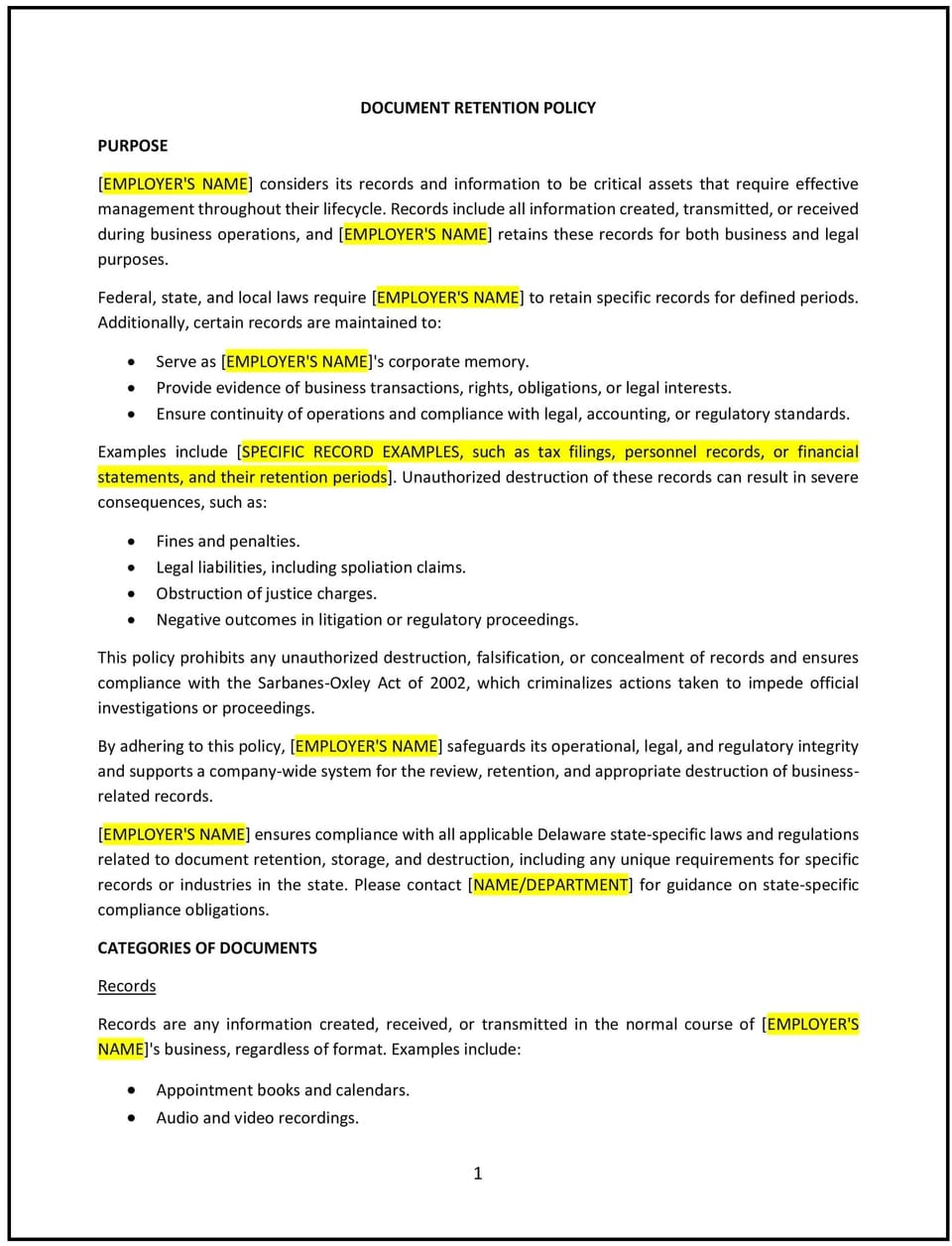Document retention policy (Delaware): Free template

Document retention policy (Delaware)
A document retention policy helps Delaware businesses establish guidelines for managing and storing company records, ensuring compliance with legal, regulatory, and operational requirements. This policy outlines the types of documents to retain, retention periods, and procedures for securely disposing of records no longer needed.
By implementing this policy, businesses can promote compliance, safeguard sensitive information, and maintain operational efficiency.
How to use this document retention policy (Delaware)
- Define document categories: Specify the types of documents covered, such as financial records, employee files, contracts, and tax-related documents.
- Establish retention periods: Outline how long different categories of documents must be retained based on Delaware and federal laws, as well as business needs.
- Assign responsibilities: Designate specific employees or teams responsible for managing document retention and disposal processes.
- Ensure secure storage: Provide guidelines for securely storing physical and digital documents to prevent unauthorized access or data breaches.
- Implement disposal procedures: Include instructions for securely shredding, deleting, or otherwise disposing of documents once the retention period has expired.
- Regularly audit compliance: Periodically review retention practices to ensure they align with legal requirements and company policies.
Benefits of using this document retention policy (Delaware)
This policy offers several benefits for Delaware businesses:
- Ensures legal compliance: Helps businesses meet document retention requirements under Delaware and federal laws.
- Safeguards sensitive information: Reduces the risk of data breaches by ensuring secure storage and disposal of records.
- Improves operational efficiency: Streamlines record-keeping practices and reduces clutter by organizing document management.
- Mitigates legal risks: Provides a clear framework for retaining documents needed for audits, litigation, or regulatory inquiries.
- Enhances accountability: Clarifies responsibilities for document management, ensuring consistent practices across the organization.
Tips for using this document retention policy (Delaware)
- Communicate the policy clearly: Ensure all employees understand their roles in document retention and disposal processes.
- Use technology: Leverage document management systems to automate retention schedules and monitor compliance.
- Regularly update retention schedules: Revise retention periods to reflect changes in Delaware laws, industry regulations, or business needs.
- Provide training: Educate employees on secure storage practices and proper disposal methods for sensitive information.
- Conduct audits: Periodically review compliance with the policy to identify and address any gaps in document management.
Q: Why is a document retention policy important for my business?
A: This policy ensures compliance with Delaware and federal laws, safeguards sensitive information, and promotes efficient document management to support audits, litigation, or operational needs.
Q: What types of documents should be covered under this policy?
A: Common categories include financial records, contracts, tax documents, employee files, customer records, and any other documents required by law or critical to business operations.
Q: How long should documents be retained?
A: Retention periods vary based on document type and applicable laws. For example, tax records may need to be retained for seven years, while employee files might require shorter or longer durations.
Q: What are the recommended procedures for securely disposing of documents?
A: Secure disposal methods include shredding physical documents and permanently deleting digital records using approved software or services.
Q: How often should this policy be reviewed?
A: This policy should be reviewed annually or whenever Delaware laws, industry standards, or organizational requirements change to ensure continued compliance and effectiveness.
This article contains general legal information and does not contain legal advice. Cobrief is not a law firm or a substitute for an attorney or law firm. The law is complex and changes often. For legal advice, please ask a lawyer.


